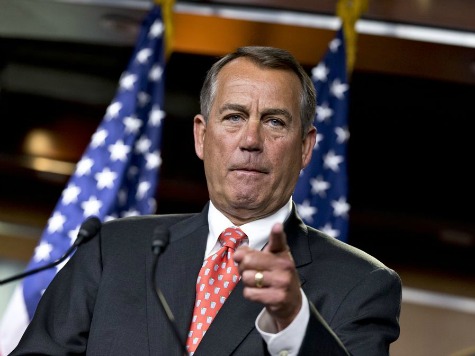
Early last Wednesday morning, soon after John Boehner’s “Plan B” had emerged on the scene, a group of conservative leaders, organized in a group called the Conservative Action Project and chaired by former Reagan Attorney General Ed Meese, met with Rep. Tim Huelskamp, a freshman Congressman from Kansas and recently deposed member of the House Budget Committee.
They wanted to determine if anything could be done to either keep “Plan B” from reaching the House Floor, or, if it did, to pull enough Republican votes together to stop it.
Such a prospect was dubious, said Huelskamp and the senior House staffers in the room, but probably only if the Rule allowing the bill to come to the floor could be brought down – something that rarely happens, and something leadership is loathe to do.
Nobody was quite sure if “Plan B” was a serious attempt to avoid the fiscal cliff, or if it was another Boehner bargaining ploy. What conservatives did know was that raising taxes, if only on less than 1% of taxpayers, would divide Republicans in exactly the way Democrats wanted to do, and it would once and for all break the Republican pledge not to raise taxes on anybody, at any time. They also knew that it was not a serious attempt to rein in spending and the growth of government.
They also knew that the only way “Plan B” would go down was if Republican House members heard from conservatives, both in Washington and in their districts, that it was unacceptable. Already some conservatives were beginning to waver, stating that maybe it was the best we could get in the fiscal cliff negotiations.
But in that early Wednesday meeting, everyone, with the encouragement of Tim Huelskamp, agreed to let Republicans in Congress know that taxes were not Washington’s problem; spending was, and conservatives would not support any tax increase.
A statement urging conservatives to oppose “Plan B” was drafted, signed by many leading conservatives, and quickly circulated by the Republican Study Committee to House members. Within minutes, House members’ phones started ringing off the hook.
An impressive group of conservative organizations, including Heritage Action, The Club for Growth, Americans for Prosperity, CNP Action, Family Research Council, The Paul Revere Project, RedState, Citizens United, Tea Party Express, FreedomWorks, and many others joined forces to let Congress know that conservatives wanted no more taxes.
The vote on the Rule prevailed Wednesday afternoon, but opposition to it made Leadership aware of the fact that “Plan B” was in trouble.
A press conference was arranged for 3 PM on the Capitol Steps, where conservative leaders blasted “Plan B” in front of nearly 100 reporters, TV cameras, and bloggers. The response was enough to solidify conservative support among members of Congress that a tax increase – any tax increase – was unacceptable.
When “Plan B” came to the floor on Thursday evening, the die was already cast. A senior House staff member who was on the floor at the time told me:
The votes were never there not just because “Plan B” was bad policy, but because leadership couldn’t make the case to members how this strengthened our hand politically. When leadership saw 13 Republican Members oppose a Rule, and 21 Members oppose the sequester replacement bill, the writing was on the wall. Boehner, Cantor, McCarthy, and Ryan were all working the floor hard for “Plan B”. McCarthy, who actually counts the votes, was the first to leave the floor. The rest weren’t far behind. They knew it was lost. A few minutes later, the special conference meeting was called to announce the end of “Plan B”.
Where we go from here is anyone’s guess, but more than a few people in Washington are asking if this might just be Y2K all over again.

COMMENTS
Please let us know if you're having issues with commenting.